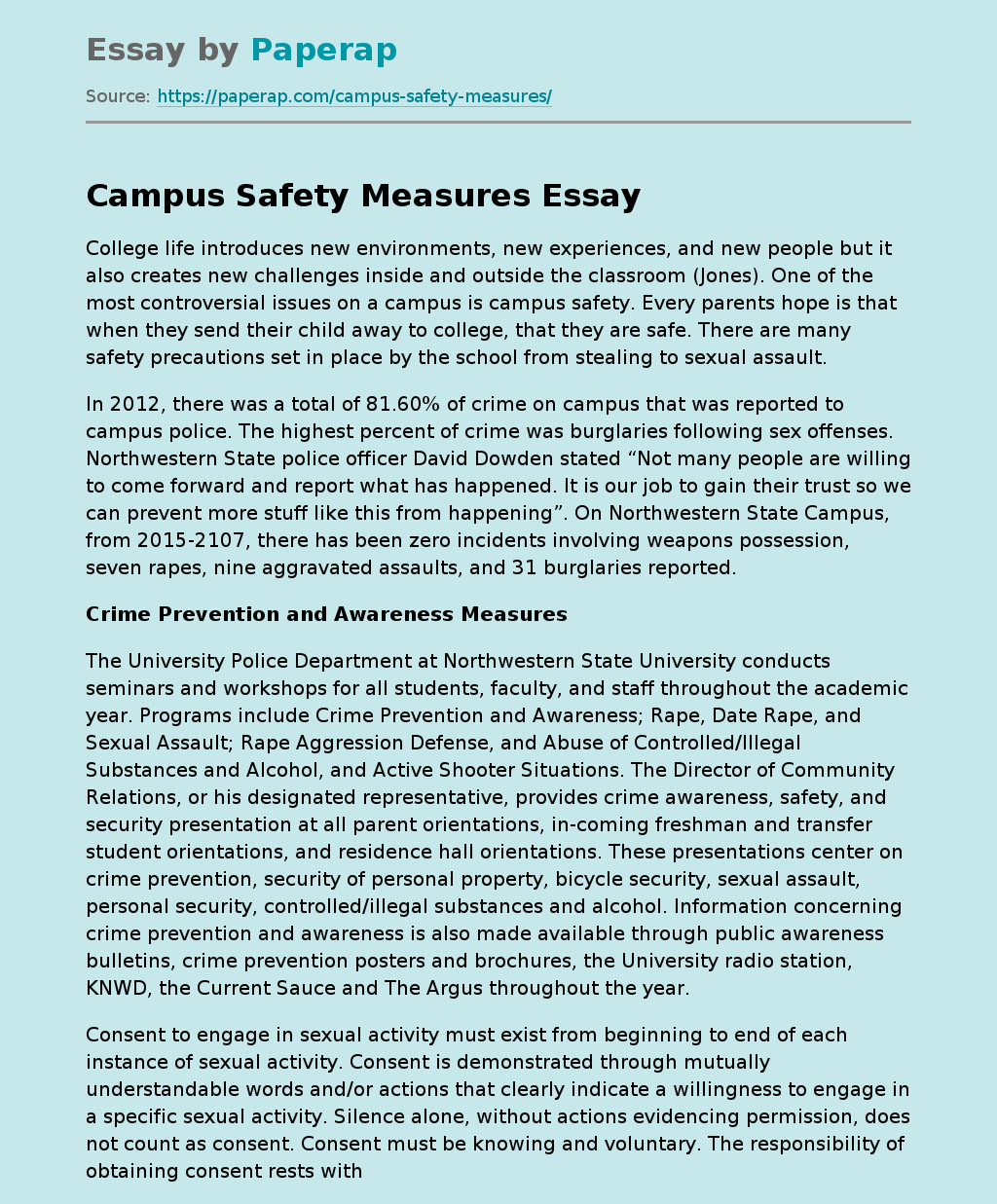Campus Safety Measures
College life introduces new environments, new experiences, and new people but it also creates new challenges inside and outside the classroom (Jones). One of the most controversial issues on a campus is campus safety. Every parents hope is that when they send their child away to college, that they are safe. There are many safety precautions set in place by the school from stealing to sexual assault.
In 2012, there was a total of 81.60% of crime on campus that was reported to campus police.
The highest percent of crime was burglaries following sex offenses. Northwestern State police officer David Dowden stated “Not many people are willing to come forward and report what has happened. It is our job to gain their trust so we can prevent more stuff like this from happening”. On Northwestern State Campus, from 2015-2107, there has been zero incidents involving weapons possession, seven rapes, nine aggravated assaults, and 31 burglaries reported.
Crime Prevention and Awareness Measures
The University Police Department at Northwestern State University conducts seminars and workshops for all students, faculty, and staff throughout the academic year.
Programs include Crime Prevention and Awareness; Rape, Date Rape, and Sexual Assault; Rape Aggression Defense, and Abuse of Controlled/Illegal Substances and Alcohol, and Active Shooter Situations. The Director of Community Relations, or his designated representative, provides crime awareness, safety, and security presentation at all parent orientations, in-coming freshman and transfer student orientations, and residence hall orientations. These presentations center on crime prevention, security of personal property, bicycle security, sexual assault, personal security, controlled/illegal substances and alcohol.
Information concerning crime prevention and awareness is also made available through public awareness bulletins, crime prevention posters and brochures, the University radio station, KNWD, the Current Sauce and The Argus throughout the year.
Consent to engage in sexual activity must exist from beginning to end of each instance of sexual activity. Consent is demonstrated through mutually understandable words and/or actions that clearly indicate a willingness to engage in a specific sexual activity. Silence alone, without actions evidencing permission, does not count as consent. Consent must be knowing and voluntary. The responsibility of obtaining consent rests with the person initiating sexual activity, but the one giving the consent, has to be mentally aware of what he or she is saying. Use of alcohol or drugs does not diminish one’s responsibility to obtain consent but makes your decision clouded. Consent to engage in sexual activity may be withdrawn by any person at any time. Once withdrawal of consent has been expressed, the sexual activity must cease. Consent is automatically withdrawn by a person who is no longer capable of giving consent (“A publication by Northwestern State University Police,” 2018)
There are multiple forms of sexual offenses; sexual harassment, stalking, coercion, sexual assault, and rape. One in five students experience some form of sexual assault while attending college. Being a victim of rape is a very tough thing to go through from being hurt physically to emotionally. After an assault, it is extremely important to receive a medical exam, even if there are no visible wounds, to test for STDs, pregnancy, or other health-related concerns (Jones). Victims should call the University police immediately so that actions can be taken in appropriate timing. The minute you realize what has happened, you must make sure you do not wash your body, hair, teeth, etc. The medical examiner needs to be able to conduct a rape kit on you. If you wash anything on your body, the evidence will be lost and it is harder to investigate and press charges eventually.
There is a rule posted on every campus that states, “Guns are prohibited on campus”. Research told me that many students do not feel safe on campus and have a concealed weapon on their possession so they can feel safe. Although they might feel safe, many others use these weapons and have caused “active shootings”. Utah is the only state allowed to have guns on a college campus.
On April 16, 2007, one of the deadliest mass shootings in U.S. history occurred. Thirty-two people died after being gunned down on the campus of Virginia Tech at 7:15 AM, by Seung Hui Cho, a student at the college who later committed suicide.
Cited Page
Jones, Ruth. “Campus Safety in 2018: College Campus Safety Tips for Students.” Affordable Colleges Online, www.affordablecollegesonline.org/campus-safety-guide/.
Campus Safety Measures. (2021, Dec 08). Retrieved from https://paperap.com/campus-safety-measures/

